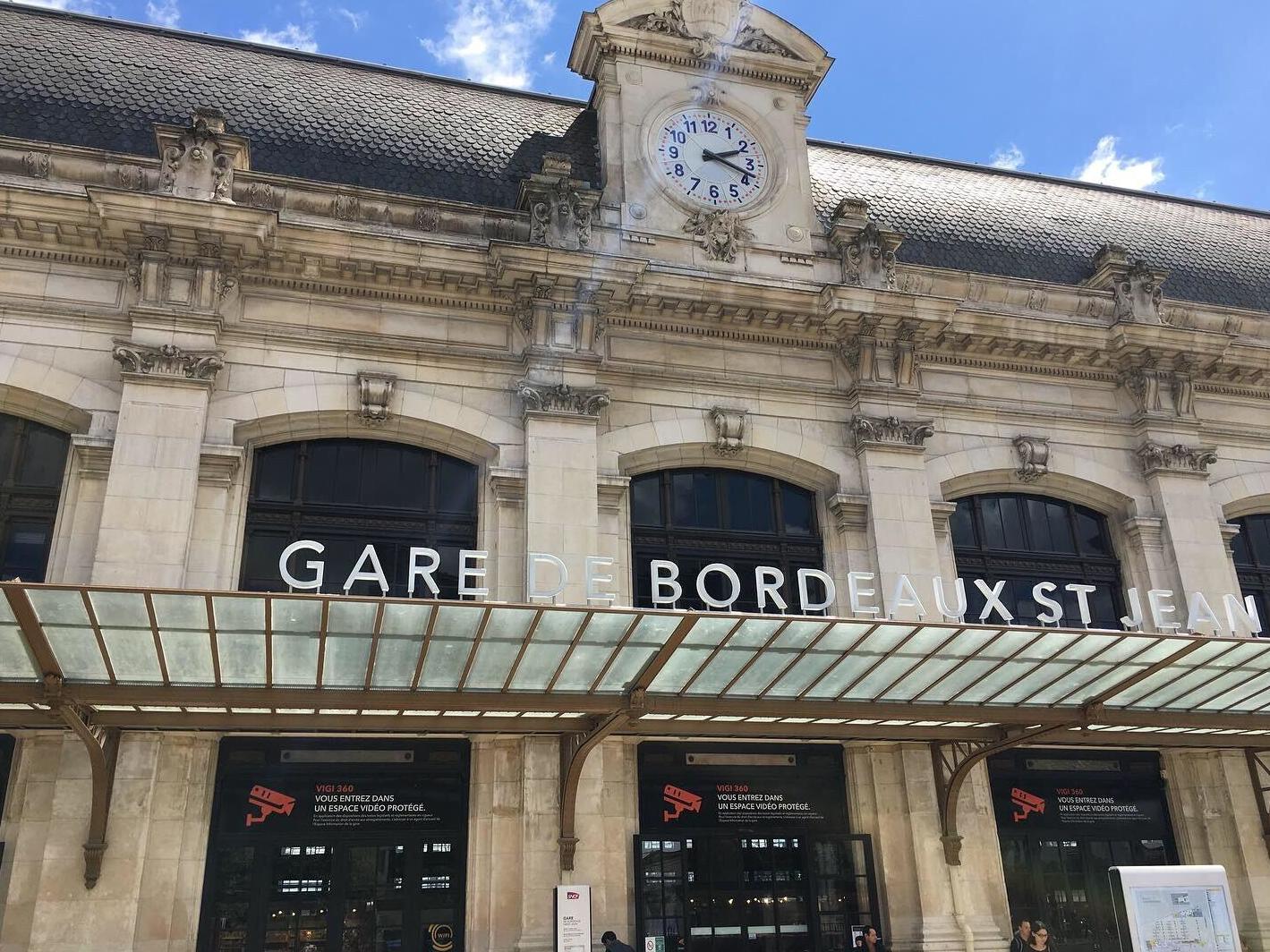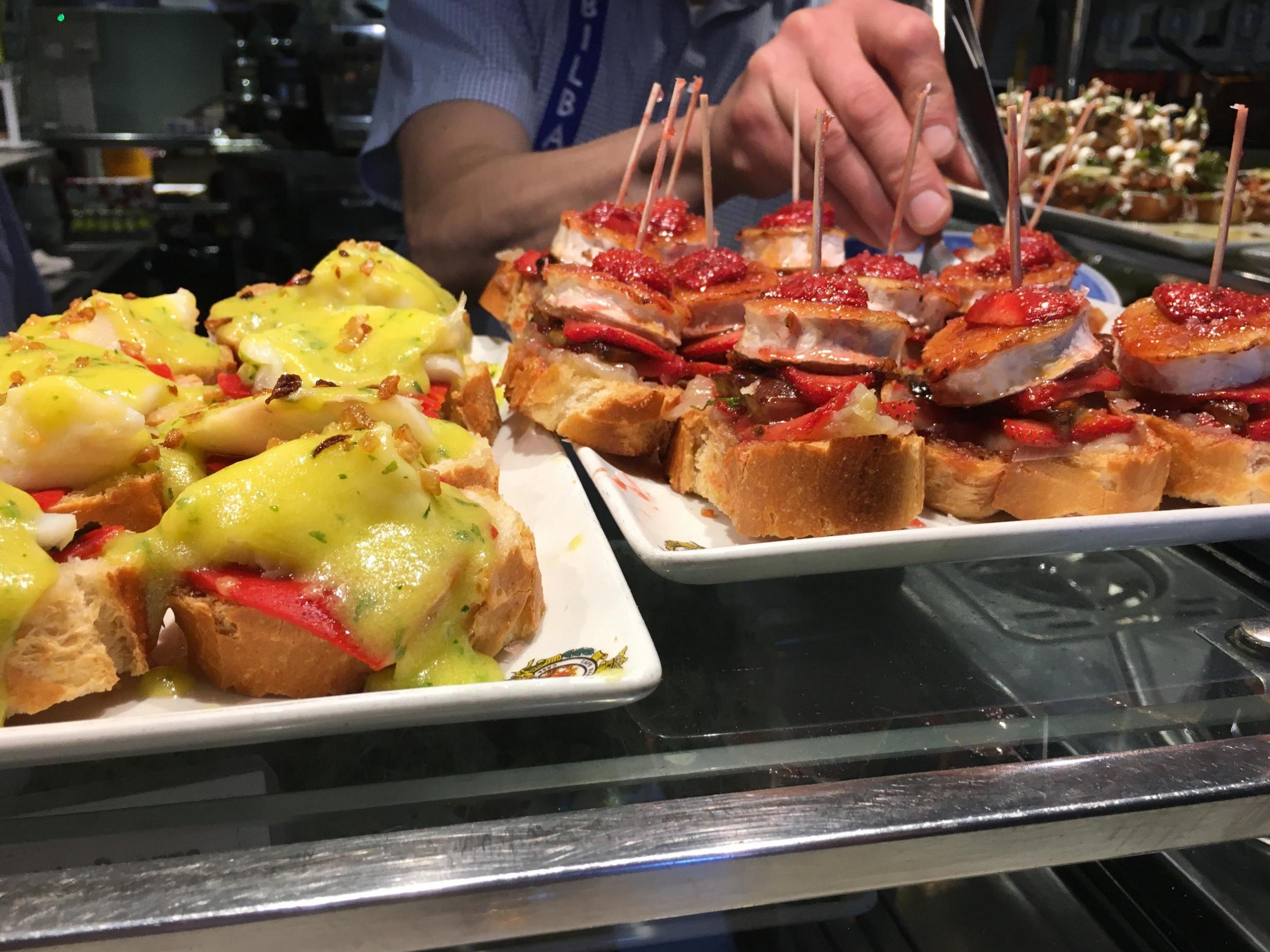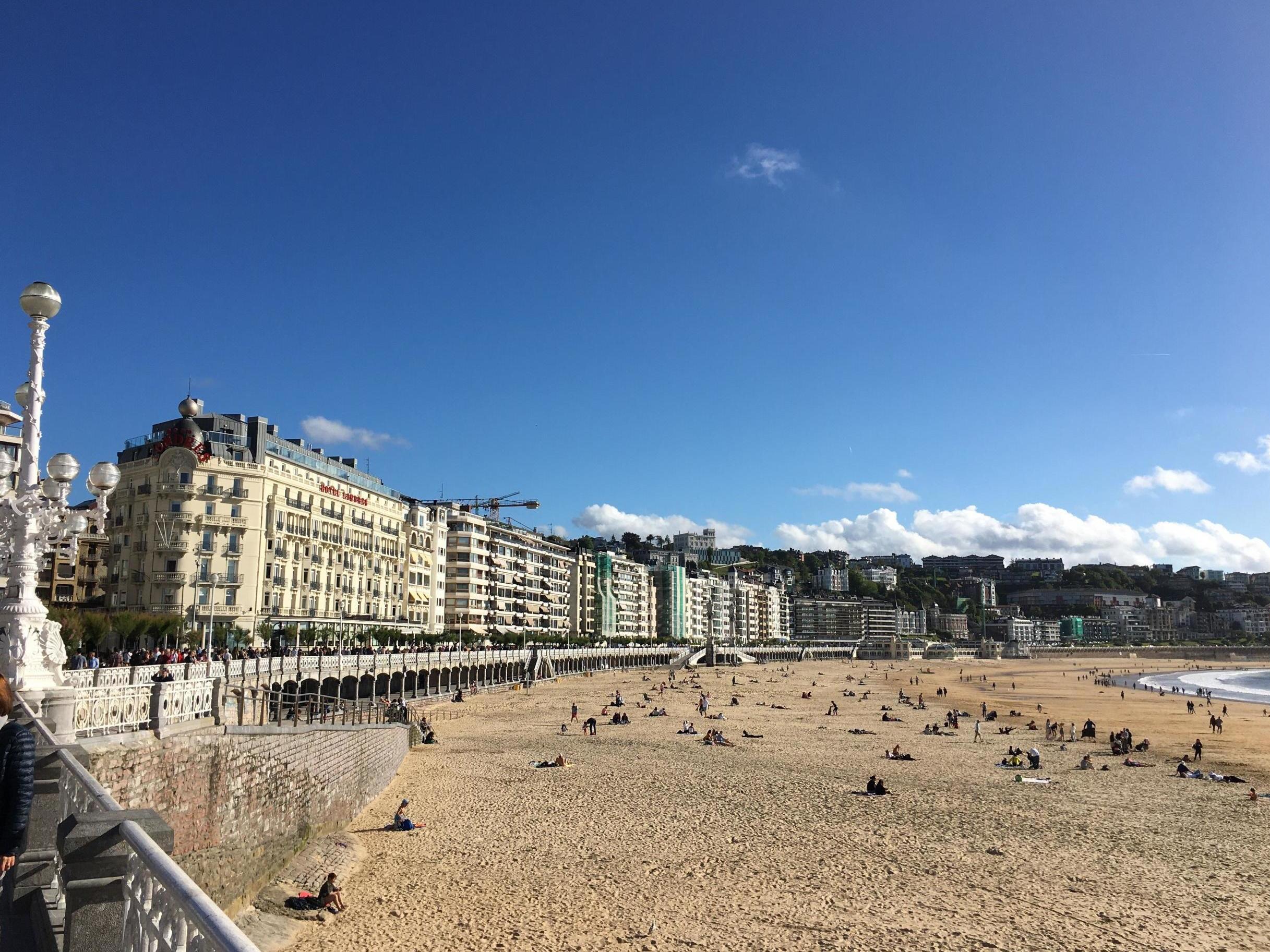Planes, trains and restaurant tips from Xabi Alonso: How I got to the 2019 Champions League final
From Liverpool to Bordeaux and then San Sebastian alongside Bilbao, our man Simon Hughes is one of thousands decamping to Madrid for Saturday's showpiece final
“I’ll have to get a new windscreen wiper blade, it’s had it,” my dad, preoccupied by an altogether more pressing matter than the Champions League final, announced at 5.45 in the morning on Wednesday. He has never been known to be late for anything, a dad in the truest sense. I could not imagine a 21-year-old version of himself heading to Rome in 1977 for Liverpool’s first European Cup final. On that train, he slept in the luggage rack above the seats for four nights in total, two there and two back – no washing facilities. His brother, John, had kept the ticket stub. My dad showed me. It read simply: Liverpool (Lime Street) to ROME AND BACK.
While John was already in Madrid with his grandson, Sam, on the way to the airport my dad had things to say about Liverpool’s present, “losing’s unthinkable”, things to say about Liverpool’s past, “saw that Christian Purslow on the TV the other day…” before revealing his plans for the final – watching it at home on his iPhone through a BT Sports app which he gets for “free, well it’s not really free”.
His match-going days stopped when I was born and when I was old enough to go, the price of tickets had already shot past a point where he deemed it acceptable. It did not help that Graeme Souness – his all-time hero, “better than Kenny Dalglish,” was failing as manager and even though he told me everything was going to be just fine, I could tell it was not.
His relationship with Liverpool was felt from the safety of a middle-distance but the club was as much a part of our lives as a relative. In the absence of siblings, he kept me busy by purchasing a dozen or so VHS videos which detailed Liverpool’s history. As a teenager, he’d played for the B team and the story he’d like to tell me the most was about the day Bill Shankly complimented him as he came off the pitch, saying something like, “well done, son.” It made him feel invincible.
Without his love for Liverpool, I thought, I would not be going to Madrid.
*
Within ten minutes of the final whistle, I’d booked flights. Barcelona at Anfield had been, in my view, the greatest performance by any Liverpool team in my lifetime. The thrill of the event, however, was swiftly replaced by some anxiety. This season, I have covered Liverpool matches in Naples, Paris, Munich, Porto and Barcelona. Understanding the brittle world of the media industry, however, I did not want to give the decision makers any reason not to send me to Madrid. In 2017, I had taken the train from Bordeaux to Cadiz. I knew it was possible to reach Madrid from Bordeaux inside 24 hours if I really pushed it and didn’t stop but that seemed joyless. The thought of a route germinated: Bordeaux, San Sebastian, Bilbao and Madrid. The flights to Bordeaux were going for £9.99. A train from Bordeaux to San Sebastian was £25. A night in a San Sebastian hovel for less than £30. The bus to Bilbao for £5 then a night in Bilbao for less than £30 again and finally the last train, £25. £124.99 all in. The journey home could wait. It would cost £20 to get to Granada by bus then another £120 from there for the flight.
I also appreciated the fortune of my position. I had time on my hands. Thousands upon thousands who have followed Liverpool home and away this season and many seasons before did not. Tighter turnarounds tend to increase outlays. I knew of those flying to Madrid and back in a day and it was costing them treble.

Liverpool supporters, however, tend to be well travelled and therefore are smart planners. Outside a well-known breakfast emporium which sells coffee at Manchester airport, I saw the first familiar face. Jim, who lives by me in Crosby, and had a background at Liverpool similar to my dad’s having played for Liverpool's youth teams as well as the reserves before his release and subsequent long career in the police force. A season ticket holder, he had lived in Spain near Salamanca and knew Madrid well. After beating Paris Saint Germain in September, he booked accommodation for a group of 12, eleven of whom had since been able to source a ticket. After knocking out Napoli in December, flights were bought as well. He explained to me that he did not orchestrate everything out of a fear of missing out. It was because of his confidence it would happen – “even after the first leg in Barcelona,” he stressed.
Roughly a quarter of the plane to Bordeaux were football supporters from Merseyside. In the boarding queues, details of journeys were exchanged. Some were staying in in the city for the night then flying elsewhere. Some were picking up hire cars and driving the rest of the way before driving all the way back. The arm of authority threatened to frustrate at least one group of lads who’d packed as much as they could into their bags (just as I had) in an attempt to reduce cost. Despite similarities, the luggage of the older, wine-drinking tourist destined to stay in France was ignored totally. Another example of the exploitation of football supporters, I thought to myself. The airlines must know everyone who looks like a football supporter is trying to make savings.
*
Joe Blott went to his first Liverpool game in 1967 but became a regular after 1971. His first European away trip was in 1978 when Liverpool went to Borussia Moenchengladbach and lost the first leg of their semi-final 2-1 before prevailing in the return at Anfield which pushed them towards Wembley and their second final in as many seasons where Brugge were beaten, 1-0. Having worked for 40 years in the public sector, he succeeded Jay McKenna a few months ago as the chair of the Spirit of Shankly group, Liverpool’s supporters’ union which was formed 11 years ago as the club lurched towards financial disaster under the ownership of Tom Hicks and George Gillett.

Though he would eventually get one, Blott had been without a ticket and was contemplating spending Saturday in Madrid sourcing when I spoke to him. He was prepared to be one of those thousands of ticketless fans because he’d already shelled out for the travel and accommodation, which would have been more difficult to arrange and altogether a much costlier business had he waited until the results of the ballot. “Uefa recommend waiting to finalise travel until you’ve got a ticket but if you do that, you can end up paying more than five times more,” Blott said. He had seen the headlines in Marca about fears relating to a British invasion of the Spanish capital and this concerned him, having witnessed the brutality of the guarda civil in Seville eighteen months ago. He believed the chances of problems would be reduced with a fairer distribution of tickets considering both Liverpool and Tottenham were getting less than 17,000 each, which accounts for less than fifty-per-cent of the host stadium’s capacity. “It’s not fair,” he insisted. “Both clubs will be underrepresented and the city – which is a capital and should be more than capable of dealing with a big football match – will be oversubscribed as a consequence. The basic maths isn’t working.”
Blott recognised the discussion about tickets must start much earlier than May, the moment two teams reach the final. Liverpool supporters, for example, had not complained too much between 2007 and 2018 about availability and before this year, it had not been a debate at Tottenham. Why would it?
Clubs, meanwhile, are not in the final every year so main concern relates to how much money they can make from the group stages which means they are more interested in how much sponsors pay rather than how many tickets they get.

For things to change, it would need the European Club Association to intervene, a body formed in 2008 to replace the G-14, and for the clubs to act collectively, recognising they’ve made enough money: to start thinking about things that really matter.
“Complaining when you’ve reached the final is too late,” Blott admitted. “As fans, we need to work together consistently and put a lot more pressure on our clubs even if we have nothing to do with the final.”
*
Some supporters would travel to another continent to reach Madrid. There was one journey that involved a flight to Marrakesh and a train to Tangier before the ferry to Algeciras. I knew of two journalists flying back from Casablanca who hoped a 55-minute layover was long-enough. Another journalist, was travelling from Baku through Moscow and the bureaucracy there meant he missed his connection and had to re-route via Rome, though he still arrived in Madrid on Thursday night having had no sleep in 48 hours.
I was in Bilbao by then. There had been a three-hour gap between my flight arriving in Bordeaux and the train leaving St-Jean station for the border town of Hendaye but a security alert and reports of a lunatic made that gap a lot shorter than it might have been. The train had started in Paris and had four more stops, in Dax, Bayonne, Biarritz and St Jean de Luz Cibou. The two-and-a-half-hour journey went through farmland and gentle forest, acting as a reminder that France first and foremost is a rugby country.

Somewhere between Dax and Bayonne, the clouds dispersed and at one point after Biarritz, I saw the Bay of Biscay for the first time. The line was just a few feet away from the water. Up and down the train I went looking for Liverpool supporters but I found only two. They were getting off at the border and ignoring San Sebastian, instead heading via bus for Burgos, the barrack town a couple of hundred miles closer to Madrid.
At Hendaye, I switched lines using the Euskotren to enter the Basque Country where instantly the land became more mountainous and verdant.
In San Sebastian, I was meeting Tim Abraham who became a good mate through work. He had covered Aston Villa when Gerard Houllier was manager but had since moved to Ecuador having met the woman of his dreams on a year-long romp around South America while writing a cricket book (finally out in autumn-time, he claims). Football, or “the match” would ensure he’d return to Liverpool at least once a year and just as I’d helped him out with accommodation in Basel for the Europa League final, he returned the favour in Kiev when we stayed on a barge moored permanently in the Dnieper river.

I had advertised San Sebastian to Tim as “the greatest small city in Europe,” which he was dubious about, I think. He became more convinced as the night progressed through the old town where, thanks to some excellent food recommendations from Xabi Alonso (I appreciate that’s a namedrop), we ate and drank very well, indeed. (Tim eventually agreed that the steak in Bar Nestor was the best he'd eaten outside Argentina).
Tim and I separated in Bilbao the next day, a very different city. I can understand why there have been anti-tourist protests in San Sebastian because the place is perfect in every way, particularly when the sun shines and the sea acts as a cooling agent. Bilbao is bigger, taller and more industrial but I can also understand why Howard Kendall loved living there amidst the bodegas, the tabernas and the sidrerias. If pushed, I’d have to say the pintxos (a small slice of bread with enormous toppings) are better in Bilbao than they are in San Sebastian and none are better than in Café Bar Bilbao in the city’s Plaza Nueva. It’s a bustling sort of place where the waiters tend not to stick around for long conversations with customers but one was intrigued by my burning face and asked where I was going next. “It will be 35 degrees,” he warned.
The furnace of Madrid awaits.
Join our commenting forum
Join thought-provoking conversations, follow other Independent readers and see their replies
Comments